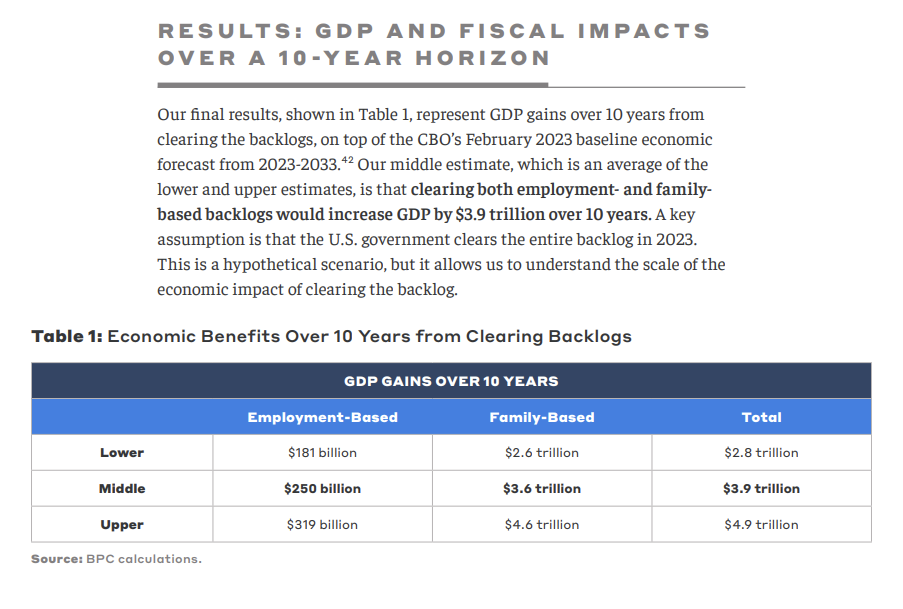Digital Bridges to Citizenship: Using AI to Advance Legal Pathways to a Viable Life in the United States

Executive Summary
The United States immigration system is often characterized by its complexity, lengthy processing times, and the significant barriers that individuals face in navigating its intricacies. This white paper explores the deployment of an AI powered virtual concierge, built with ChatGPT, acting as a transformative solution to enhance accessibility, efficiency, and user experience within the immigration process. Drawing insights from the scholarly article “Green Light to Growth: How Policy Reform Can Advance American Entrepreneurship and Innovation” by the Bipartisan Policy Center, we argue that the integration of this technology can address key challenges identified within the U.S. immigration system. One case at a time, AI can help us build digital bridges that yield legal pathways to work visas, lawful permanent residency, and citizenship.
Introduction
The immigration system in the United States has long been due for modernization. It is a system fraught with backlogs, inefficiencies, and a lack of transparency, leading to frustration and unnecessary hurdles for applicants seeking to navigate its processes. The article “Greenlight to Growth” from the Bipartisan Policy Center underscores the vital need for sound immigration policies to bolster American entrepreneurship and innovation. An AI-powered virtual concierge could play a substantial role in realizing this goal by offering real-time assistance and personalized guidance to users.
Problem Identification
The Bipartisan Policy Center’s report reflects on several challenges faced by the U.S. immigration system, including:
- Complexity of the Legal System: Immigrants often struggle with understanding the legal requirements and procedures for entry and residency in the U.S., which can lead to errors and delays in application processing.
- Inadequate Access to Information: Potential immigrants require timely and accurate information to make informed decisions, but often face barriers in accessing such resources.
- System Inefficiencies: With limited resources and high demand, the current system is unable to process applications quickly, resulting in extensive backlogs.
- Economic Impact: The report emphasizes the positive economic contributions of immigrants, highlighting the need for a system that supports rather than hinders this potential.
ProPrudence’s AI Powered Virtual Concierge as a Solution
Our AI concierge system addresses these challenges in the following ways:
- Simplifying Legal Complexity: The AI concierge, equipped with the latest information on U.S. immigration laws, can provide clear, concise, and personalized answers to user queries, helping to demystify the complex legal framework.
- Improving Access to Information: The AI system can be accessed from anywhere at any time, providing a convenient and accessible platform for potential immigrants to obtain the information they need.
- Enhancing Efficiency: By handling routine inquiries and guiding users through the initial stages of the immigration process, the AI concierge can reduce the workload on human staff, allowing them to focus on more complex cases and reducing overall processing times.
- Fostering Economic Growth: By streamlining the immigration process, the AI concierge system can help talented entrepreneurs and skilled workers enter the U.S. more easily, thus contributing to economic growth and innovation, as emphasized in the Bipartisan Policy Center’s report.

Implementation and Recommendations
For the AI concierge to effectively complement the U.S. immigration system, we recommend the following steps:
- Integration with Legal Networks: The system should work in tandem with a network of immigration attorneys to ensure that users can seamlessly transition to professional legal advice when necessary.
- Continuous Learning and Updates: The AI should be continually trained on the latest immigration laws and policies to maintain the accuracy and relevance of the information provided.
- User Privacy and Security: Implement robust data protection measures to safeguard the confidentiality of user information.
- User-Centric Design: Design the AI system with a focus on user experience, ensuring that it is intuitive and accessible to individuals with varying levels of technical proficiency.
Conclusion
The use of an AI-powered concierge system has the potential to play a part in revolutionizing the United States immigration system, making it more accessible, efficient, and conducive to economic growth. By addressing the challenges outlined in the report from the Bipartisan Policy Center, this technology serves as a critical tool in building an immigration framework that is fit for the 21st century.

Call to Action
To move forward, it is imperative that stakeholders—policy makers, technology developers, immigration authorities, and legal experts—collaborate in adopting and refining AI-powered tools like ProPrudence’s AI concierge to ensure they meet the evolving demands of the U.S. immigration system. By embracing innovation, we can create a more dynamic, responsive, and equitable immigration process for all.




